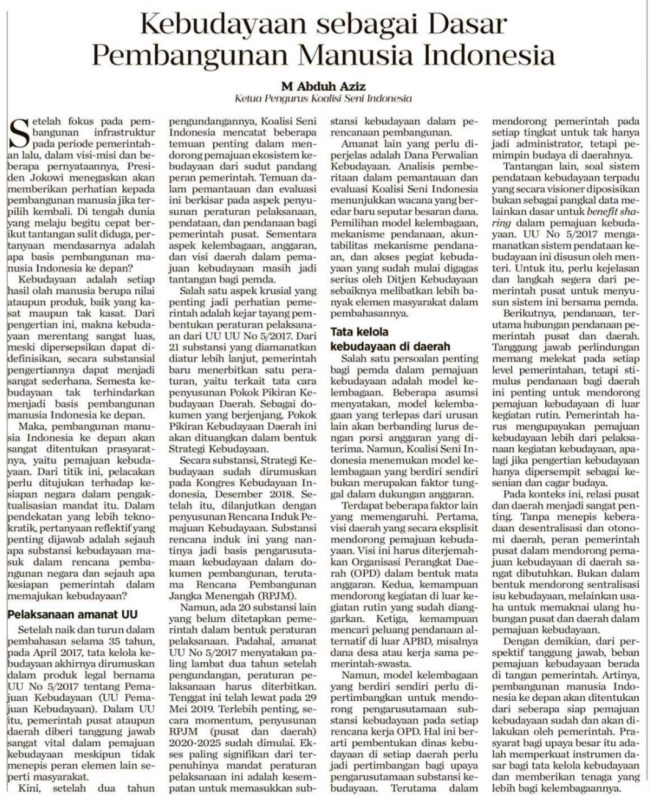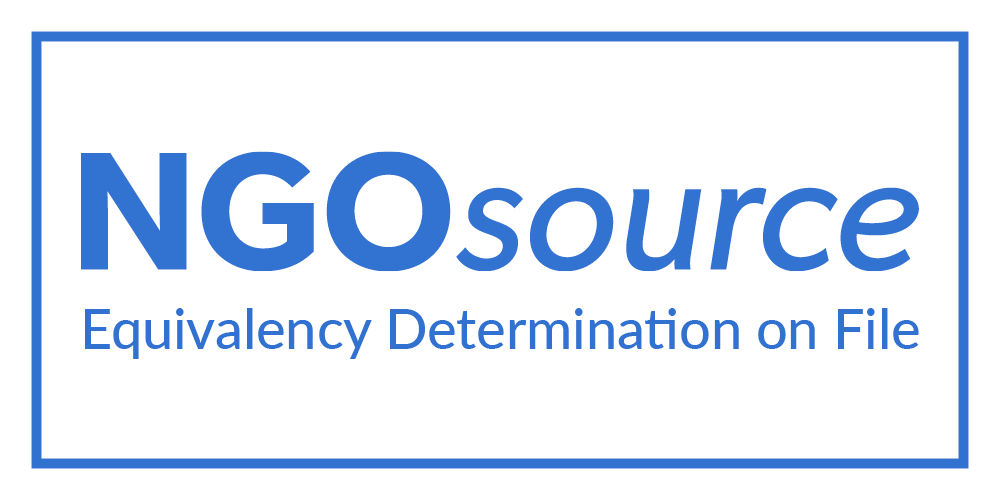By Abduh Aziz, Chair of the Executive Board of Koalisi Seni
This op-ed was published in Harian Kompas on June 28, 2019
 After focusing on infrastructure development during his previous term, in his vision and missions as well as in his statements, President Joko Widodo emphasized that human development would be the next focus if he was re-elected. In this fast-moving world full of unexpected challenges, the main question will be: “What is the basis of Indonesia’s human development effort going forward?”
After focusing on infrastructure development during his previous term, in his vision and missions as well as in his statements, President Joko Widodo emphasized that human development would be the next focus if he was re-elected. In this fast-moving world full of unexpected challenges, the main question will be: “What is the basis of Indonesia’s human development effort going forward?”
Culture is every human’s creation, whether it is a value or a product, and whether it is tangible or intangible. This statement gives culture a very broad definition despite the fact that it is supposedly able to be defined. To the contrary though, the definition may substantially be so simple. And, the cultural universe inevitably becomes the basis of Indonesia’s human development in the future.
Indonesia’s human development therefore will be largely defined by the precondition, that is the cultural advancement. Taking that as a starting point, the discussion then should be focused on the government’s preparation to fulfill that responsibility. In a more technocratic approach, the reflective question needing an answer is to what extent is this cultural element being taken into account in the national development plan and how far has the government prepared for the cultural advancement?
The Implementation of Law
After alternating between being put in and out of the agenda for 35 years, eventually in April 2017, the cultural governance was enacted through the Law No. 5 of 2017 on Cultural Advancement (Cultural Advancement Law). The Law stipulates that both the national government and the local governments are mainly responsible for advancing cultures even though others such as the community can still participate in doing so.
Now, after its two-year implementation, Koalisi Seni Indonesia has identified several important findings in regard to the culture ecosystem advancement on the government’s part. These monitoring and evaluation findings are related to the development of regulation for implementation, data collection, and funding as part of the national government’s responsibilities. In the meantime, institutional issues, budget, and regional vision of cultural advancement are some of the challenges that the local governments still face.
One of the important issues that the government should address is the tight deadline to develop the implementing regulation of the Law No. 5 of 2017. Out of 21 provisions requiring further regulations, the government has only issued one related to the procedure for developing a problem statement for regional cultural issues (a document known as Pokok Pikiran Kebudayaan Daerah). Forming a part of a cumulative document, Pokok Pikiran Kebudayaan Daerah will be included in the Cultural Strategy (Strategi Kebudayaan).
Substantially, the Cultural Strategy was already developed at the Indonesian Cultural Congress, held in December 2018. The Cultural Advancement Master Plan was subsequently developed. The provisions within this master plan will form the basis of the culture mainstreaming in development plan documents, particularly the Medium-term Development Plan (RPJM).
Nonetheless, there are still 20 provisions awaiting to be enacted as implementing regulations. As a matter of fact, the Law No. 5 of 2017 stipulates that an implementing regulation needs to be enacted no longer than a two-year period. The deadline already passed on May 29, 2019. Furthermore, the development of (national and regional) 2020–2025 RPJM has begun. The most significant development in the implementation of this implementing regulation is the possibility to integrate the cultural aspects into the development plan.
Another provision needing clarification is the Cultural Trust Fund. The news analysis performed as part of Koalisi Seni Indonesia’s monitoring and evaluation initiative found that currently, the allocated budget is the only matter under discussion. Institutional model, funding mechanism, accountability for the funding mechanism, and access for cultural activists, which have been addressed in a more serious manner by the Directorate-General for Cultures, should encourage the participation of more groups of the community in their development.
Regional cultural governance
One of the important cultural advancement issues encountered by the local governments is the institutional model. Some assume that an institutional model that is separate from other affairs will proportionately pull in more budget allocations. Koalisi Seni Indonesia, however, has found that an independent institutional model is not the only factor in boosting the budget allocations.
There are other contributing factors as well. The first factor is regional vision which clearly promotes cultural advancement. This vision should be translated by Local Government Agencies (Organisasi Perangkat Daerah or OPD) as a budget line item. The second one is the ability to encourage other activities beyond the scope of regular activities with allocated budgets. The last is the ability to seek alternative funding opportunities other than regional budgets, for example Village Funds (Dana Desa) or a public-private partnership.
Nevertheless, an independent institutional model should still be considered in order to promote cultural aspects mainstreaming into every OPD’s work plan. This means that establishing cultural offices across regions should be considered in mainstreaming cultural aspects, particularly in order to encourage the government at every level not only to become the administrator, but also to lead the cultural initiative in their own region.
Another challenge is issues related to the Integrated Cultural Data Collection System (Sistem Pendataan Kebudayaan Terpadu), which should not purposefully be positioned as a database, but a foundation for benefit sharing in the cultural advancement. The Law No. 5 of 2017 requires that this Integrated Cultural Data Collection System is developed by ministries. Consequently, the national government, in coordination with the local governments, should provide clarification and take immediate actions to develop the system.
The next challenge is related to funding, especially in the context of the relationship between the national government and the local governments. The government at every level is clearly responsible for cultural preservation, but this regional stimulus funding is important to promote cultural advancement in the form of non-regular activities. The government should strive for the cultural advancement beyond the implementation of cultural activities, especially when the definition of culture itself is narrowed to only art and cultural properties.
In this context, the relationship between the national government and the local governments becomes increasingly important. Without overlooking the principles of decentralization and regional autonomy, the role of the national government in the cultural advancement across the regions is highly necessary. It does not necessarily mean that the cultural issues are being centralized, but it is an attempt to redefine the relationship between the national government and the local governments in regard to cultural advancement.
Therefore, as far as responsibilities are concerned, the burden of cultural advancement is placed on the government. It can be safely assumed that Indonesia’s human development in the future will depend on how the government has and will prepare for the cultural advancement. The prerequisites for this hard work include strengthening the main instrument for cultural governance and empowering the government’s institutions even further.



